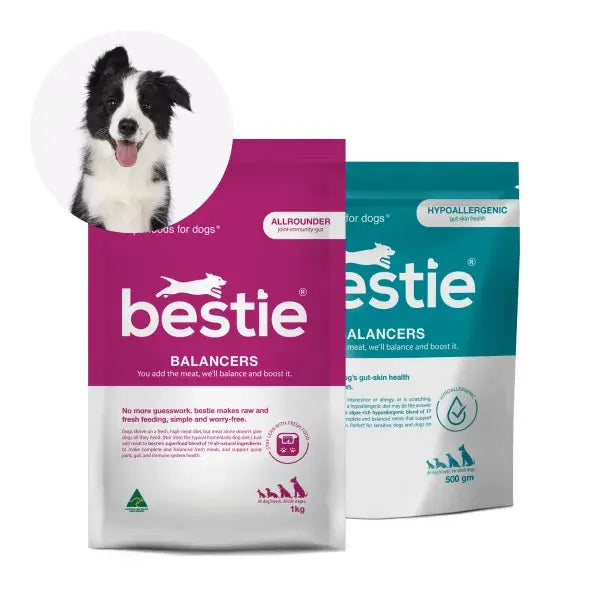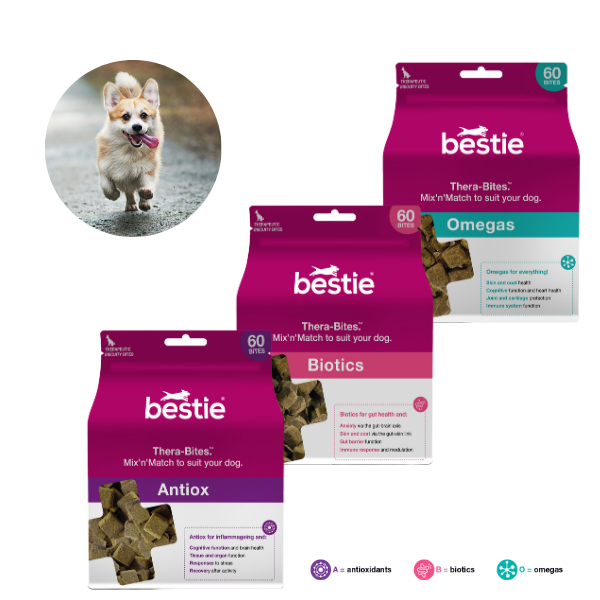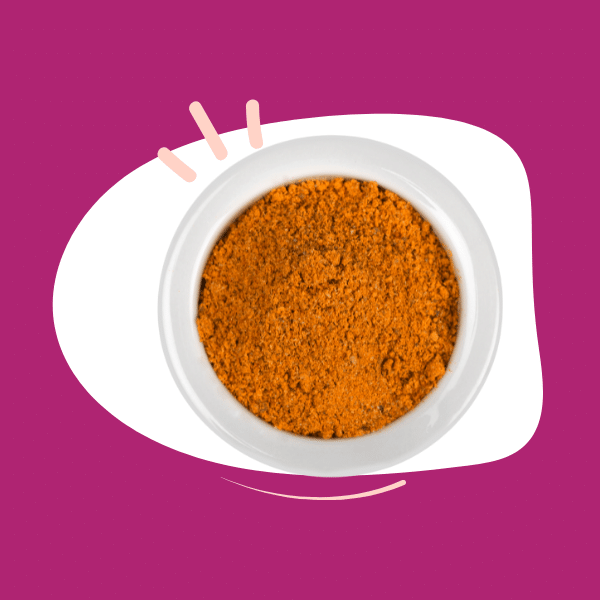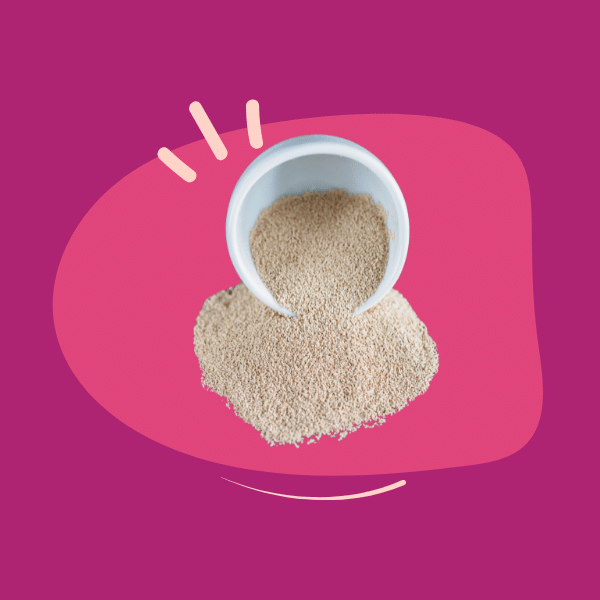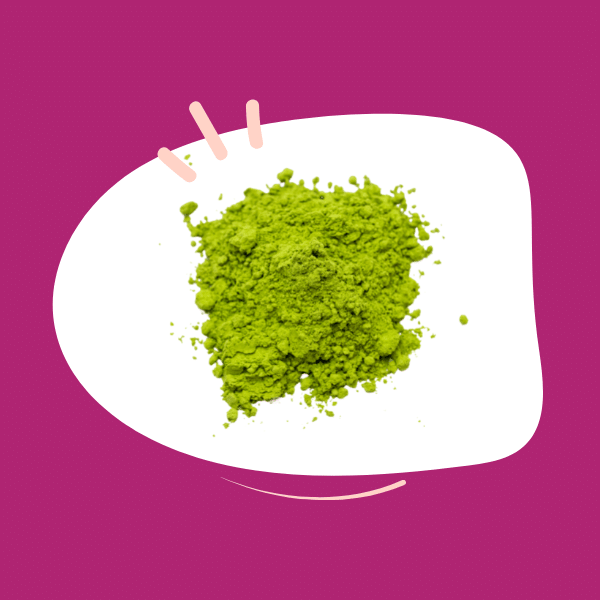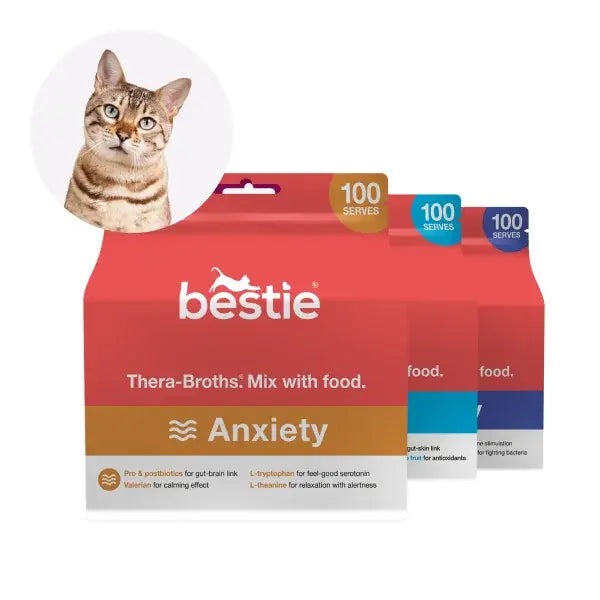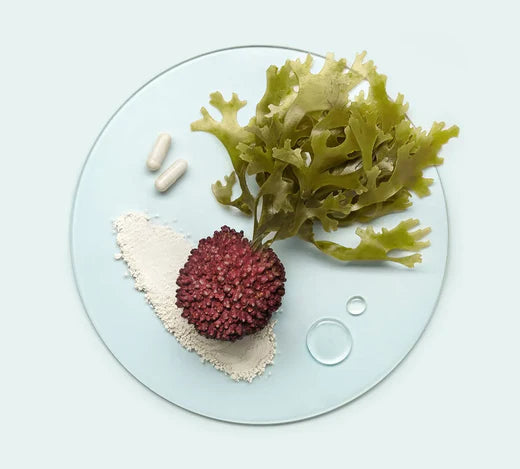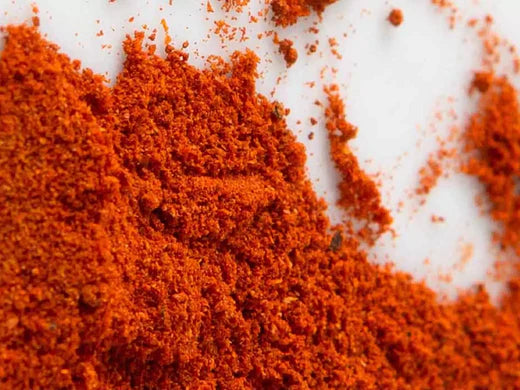Yeast is commonly associated with baking bread, cakes, and other delicious goodies. But there is a type of yeast that is incorporated in many pet food formulas and supplements because it’s jam-packed with essential nutrients.
Nutritional yeast (also known as savoury yeast flakes, yeshi, nooch, or brufax) is an inactive form of yeast that is a powerhouse of essential amino acids, B-vitamins, bioactive minerals, immune system boosters, and powerful antioxidants.
That powerful array of nutrients is also the reason that nutritional yeast is a key ingredient in bestie’s ALLROUNDER balancing pre-mix, plus the daily supplements Bestie Anxiety, and Bestie Puppy for puppy stress and to help with resilience. (Plus, it tastes great!)
Brewer’s yeast versus nutritional yeast
Both brewer’s yeast and nutritional yeast are made from a single-celled fungus Saccharomyces cerevisiae, more commonly known as yeast. The fungus is deactivated before they are used in food products, including pet food. This means that there is no truth to the assumption that consuming food or supplements that contain brewer’s yeast or nutritional yeast can cause the overgrowth of yeast in the body.
However, both brewer’s yeast and nutritional yeast have different nutritional profiles even though they are made from the same species. This is attributed to how each product is made.
Unlike brewer’s yeast, nutritional yeast is always “primary grown,” which means it is created specifically for the purpose of producing a dietary supplement.1
What makes nutritional yeast a nutrient powerhouse?
There are two types of nutritional yeast-- fortified and non-fortified.
- Non-fortified nutritional yeast does not contain added vitamins, minerals, and other nutrients. It contains only the nutrients that are naturally synthesised by the yeast as they grow. (This is what we use in bestie products.)
The naturally-occurring nutrients in non-fortified nutritional yeast include vitamin B1 (thiamine), vitamin B2 (riboflavin), niacin (vitamin B3), vitamin B5 (pantothenic acid), vitamin B6 (pyridoxine), vitamin B7 (biotin), vitamin B9 (folic acid/folate), B12 (cyanocobalamin), calcium, iron, magnesium, zinc, selenium, chloride, sodium, and potassium.
- Fortified nutritional yeast has been added with synthetic vitamins, minerals, and other nutrients during the manufacturing process to boost its nutrient profile.
Table 1. Nutrition Information of Nutritional Yeast (2 tablespoon serving)
|
|
|
|
Calories |
50 |
|
Protein |
8-10 grams (depending on brand) |
|
Fat |
1 gram |
|
Carbohydrates |
5-9 grams (depending on brand) |
|
Fibre |
4-5 grams (depending on brand) |
|
Sugar |
0 grams |
|
B-Vitamins l Thiamine l Riboflavin l Vitamin B6 l Vitamin B12 |
9.6 milligrams (640 percent DV) 9.7 milligrams (570 percent DV) 9.6 milligrams ((480 percent DV) 7.8 micrograms (130 percent DV) |
|
Folate |
240 micrograms (60 percent DV) |
|
Zinc |
3 milligrams (20 percent DV) |
|
Pantothenic acid |
1 milligram (10 percent DV) |
|
Magnesium |
24 milligrams (6 percent DV) |
|
Copper |
0.1 milligrams (6 percent DV) |
|
Manganese |
0.1 milligrams (6 percent DV) |
|
Iron |
0.4 milligrams (4 percent DV) |
Source: Nutritional Yeast: Is It Good for You?
l Essential amino acids
Nutritional yeast has the 10 amino acids that dogs need, making it a complete source of protein.
Table 2. Amino Acid Profile of Nutritional Yeast
|
Essential amino acid |
Yeast mg/g protein |
Complete protein mg/gram |
|
Threonine |
46 |
23 |
|
Valine |
49 |
39 |
|
Isoleucine |
37 |
30 |
|
Leucine |
64 |
59 |
|
Phenylalanine |
33 |
30 |
|
Lysine |
65 |
45 |
|
Methionine |
14 |
16 |
|
Tryptophan |
10 |
6 |
Source: Nutritional Yeast Amino Acid Profile
B-vitamins
Nutritional yeast is a powerhouse of B- complex vitamins including thiamine (B1), riboflavin (B2), niacin (B3), B5 (pantothenic acid), B6 (pyridoxine), B7 (biotin), and B12 (cyanocobalamin).
It’s one of the only plant-based sources of vitamin B12, which is typically only found in animal-based sources including meat, eggs, fish, and milk.
Since the B-vitamins are available in their natural forms, they can easily be digested and processed in the body without the side effects associated with synthetic vitamin B supplements.
B-vitamins are water-soluble so your pet must consume adequate amounts from their daily diet.
Bioactive trace minerals
Chromium, selenium, zinc, iron, magnesium, copper, and manganese are minerals that play significant roles in various physiological processes in the body that are essential for good health.
Antioxidants
Nutritional yeast has an abundance of glutathione and selenomethionine which are powerful antioxidants. Substantial quantities of selenium also contribute to the antioxidant properties of nutritional yeast.
Immune-system boosters
Beta-glucan and alpha-mannan are types of carbohydrates with immune-boosting properties.
Why does nutritional yeast help reduce anxiety?
The B-vitamins in nutritional yeast have been shown to be beneficial in alleviating symptoms associated with stress and anxiety.5
B vitamins play important roles in the synthesis and regulation of neurotransmitters, serotonin and dopamine, which are implicated in mood regulation, as well as clinical depression and anxiety. B vitamin supplementation may offer an alternative or can be used as an adjunctive treatment to antidepressant medications at optimising mood via modulation of the neurotransmitter function.6
Vitamin B1 helps balance blood sugar levels which is a significant factor in anxiety levels. As the brain is primarily fuelled by glucose, low blood sugar can cause anxiety and irritability.
Likewise, stress has been shown to negatively affect blood glucose regulation. Specifically, hormonal changes during acute and chronic stress can affect glucose balance.7
Vitamin B3 (niacin) is important in serotonin synthesis which has been shown to help with anxiety. Tryptophan is the precursor of serotonin and vitamin B3 (niacin). Serotonin, a neurotransmitter, influences a wide range of physiological and mental functions, including mood and emotions.
Vitamin B5 (pantothenic acid) supports adrenal gland function and promotes the reduction of stress and anxiety levels. Exposure to stress can trigger the release of cortisol from the adrenal glands. Prolonged exposure can drain the adrenal glands and eventually lead to symptoms of adrenal fatigue that include depression and anxiety.
Chronic or long-term stress can change the biology of the brain, which can increase vulnerability to depression and anxiety. Vitamin B6 (pyridoxine) helps modulate the production of the neurotransmitters serotonin and GABA which control depression, perception of pain, and anxiety.8
Vitamin B9 (folate or folic acid) helps in easing out depressive moods. Adequate intake of folic acid may reduce the risk for depressive disorders and increase medication response in patients suffering from depression and anxiety.9
The level of B12 in the body plays an important role in the development of depression/anxiety and clinical symptoms. The vitamin is especially powerful for balancing the mood and has been found to be an effective option for the treatment and prevention of depression and anxiety.10
Calcium works with magnesium in helping maintain balance in nervous system function which could help prevent panic attacks, anxiety, or restlessness. Magnesium also benefits the nervous system with its calming properties.
If your pet is suffering from anxiety, supplementation with nutritional yeast may help improve symptoms associated with the problem. Adequate intake of essential nutrients in nutritional yeast can regulate mood, as well as depression and anxiety.
What else is beneficial about nutritional yeast?
A complete protein source
Essential amino acids cannot be synthesized in the body thus they should be present in the daily diet. Nutritional yeast has all the 10 essential amino acids that dogs need.
Protein plays an important role in the building and repair of body tissues, and the production of enzymes, hormones, and blood cells. It’s also an essential nutrient in skin and hair coat health.
Amino acids which are building blocks of protein help produce neurotransmitters, dopamine and serotonin, that help prevent and treat depression and anxiety. Research suggests that a diet lacking in macro and micro-nutrients may lead to deficiencies that are associated with depression and anxiety disorders.2
Powerful antioxidants
The powerful antioxidants in nutritional yeast, glutathione, and selenomethionine, can help reduce oxidative stress in the body, protect cells against damage, and reduce inflammation.
Free radicals are natural by-products of metabolism. Excessive quantities of free radicals in the body can lead to oxidative stress which can pave the way for the development of a variety of serious health issues.
The antioxidants combat free radicals while protecting body cells and function.
Helps boost energy
The high levels of vitamin B12 boost energy, play a role in the synthesis of red blood cells, and metabolism. It is also an appetite stimulant. A lack of B12 is often characterised by fatigue and anaemia.
The protein in nutritional yeast also provides energy and stamina.
Supports a healthy pregnancy
The folic acid in nutritional yeast can help prevent congenital abnormalities and support foetal growth.
Lowers cholesterol
The two predominant types of carbohydrates in nutritional yeast -- alpha-mannan and beta-glucan have been shown to lower cholesterol.3
Maintains blood glucose levels
Chromium and vitamin B1 in nutritional yeast help in the maintenance of normal blood glucose levels.
Probiotic-like effects
Nutritional yeast also has a probiotic-like effect on the intestines. Several studies have shown that it confers beneficial effects against various pathogens in the intestinal tract via various mechanisms. It has also been shown to enhance the integrity of the epithelial barrier of the intestine.
One of the benefits of using S. cerevisiae var. boulardii (yeast) as a probiotic is the natural resistance to antibacterial antibiotics, thus it can be prescribed to patients receiving antibacterial antibiotic therapy.4
Several studies have also proven the efficacy of S. cerevisiae var. Boulardii in the treatment and prevention of acute and infectious diarrhoea and other intestinal diseases. It has been shown to prevent and reduce the incidence of diarrhoea and decrease the length of the disease.11
Food-protein intolerance
When the permeability of the intestinal mucosa increases in neonates and young infants, it can increase their risks for reactions to food antigens that lead to food intolerance. Nutritional yeast has been shown to help prevent these reactions which could certainly help prevent food intolerance.12
Other benefits
Other beneficial functions of yeasts are the improvement of bioavailability of minerals through the hydrolysis of phytate, folate biofortification, and detoxification of mycotoxins due to surface binding to the yeast cell wall.4
Nutritional yeast for pets
Nutritional yeast is packed with health-promoting nutrients to boost your pet’s diet and ensure adequate intake of essential vitamins and minerals.
Nutritional yeast is a flavour enhancer that can encourage your pet to eat more. A study conducted on female beagles showed that those fed a diet containing nutritional yeast consumed their food at a higher rate than the dogs fed the control diet.13
Take note that nutritional yeast has been inactivated and won’t give your pet health issues caused by yeast or fungi. It is also different from the yeast that’s used for bread which is dangerous for cats and dogs.
Nutritional yeast is generally safe for pets. As with any supplement, your pet should be closely monitored for any reactions especially when it’s your first time adding it to your pet’s diet. If your pet is immunocompromised, allergic to yeast, has gastrointestinal bleeding, or is on any medication, you should consult your veterinarian before offering any supplement to your pet.
List of References:
- Seitz, Sara. Brewer’s Yeast vs Nutritional Yeast: Which is Better for You? Accessed: 04 April 2022.
- Preeti Khanna, Bani Tamber Aeri. Association of Quantity and Quality of Protein Intake with Depression and Anxiety Symptoms among Adolescent Boys and Girls (13-15 Years) Studying in Public Schools of Delhi. J Nutr Sci Vitaminol (Tokyo). 2020;66 (Supplement):S141-S148. doi: 10.3177/jnsv.66.S141.
- Petr Sima, Luca Vannucci, and Vaclav Vetvicka. β-glucans and cholesterol (Review). Int J Mol Med. 2018 Apr; 41(4): 1799–1808. Published online 2018 Jan 22. doi: 10.3892/ijmm.2018.3411
- Saloomeh Moslehi-Jenabian, Line Lindegaard Pedersen, and Lene Jespersen. Beneficial Effects of Probiotic and Food Borne Yeasts on Human Health. Nutrients. 2010 Apr; 2(4): 449–473. Published online 2010 Apr 1. doi: 10.3390/nu2040449
- Kathleen Mikkelsen, Karen Hallam, Lily Stojanovska, Vasso Apostolopoulos. Yeast based spreads improve anxiety and stress. Journal of Functional Foods. Volume 40, January 2018, Pages 471-476
- Lauren M Young, Andrew Pipingas, David J White, Sarah Gauci, and Andrew Scholey. A Systematic Review and Meta-Analysis of B Vitamin Supplementation on Depressive Symptoms, Anxiety, and Stress: Effects on Healthy and ‘At-Risk’ Individuals. Nutrients. 2019 Sep; 11(9): 2232. Published online 2019 Sep 16. doi: 10.3390/nu11092232
- Marcovecchio, ML. Chiarelli, F. The effects of acute and chronic stress on diabetes control. Sci Signal 5. 2012; 10. doi: 10.1126/scisignal.2003508
- McCarty, M.F. High-dose pyridoxine as an ‘anti-stress’ strategy. Medical Hypotheses. Volume 54, Issue 5, May 2000, Pages 803-807
- Guixiang Zhao, Earl S Ford,1 Chaoyang Li, Kurt J Greenlund, Janet B Croft, and Lina S Balluz. Use of folic acid and vitamin supplementation among adults with depression and anxiety: a cross-sectional, population-based survey. Nutr J. 2011; 10: 102. Published online 2011 Sep 30. doi: 10.1186/1475-2891-10-102
- Todorov, A.A. et al. Correlation between Depression and Anxiety and the Level of Vitamin B12 in Patients with Depression and Anxiety and Healthy Controls.Sciendo. Volume 10 (2017): Issue 2 (December 2017). Published Online: 30 Jun 2018. DOI: https://doi.org/10.1515/jbcr-2017-0023
- Bleichner G, H Bléhaut, H Mentec, D Moyse. Saccharomyces boulardii prevents diarrhea in critically ill tube-fed patients. A multicenter, randomized, double-blind placebo-controlled trial. Clinical Trial Intensive Care Med. 1997 May;23(5):517-23. doi: 10.1007/s001340050367.
- Jean-Paul Buts, Nadine De Keyser, Catherine Stilmant, Etienne Sokal, Soheila Marandi. Saccharomyces boulardii enhances N-terminal peptide hydrolysis in suckling rat small intestine by endoluminal release of a zinc-binding metalloprotease. Pediatr Res. 2002 Apr;51(4):528-34. doi: 10.1203/00006450-200204000-00021.
- Ching-Yen Lin, Celeste Alexander, Andrew J Steelman , Christine M Warzecha , Maria R C de Godoy , Kelly S Swanson.Effects of a Saccharomyces cerevisiae fermentation product on fecal characteristics, nutrient digestibility, fecal fermentative end-products, fecal microbial populations, immune function, and diet palatability in adult dogs.J Anim Sci. 2019 Apr 3;97(4):1586-1599. doi: 10.1093/jas/skz064.


